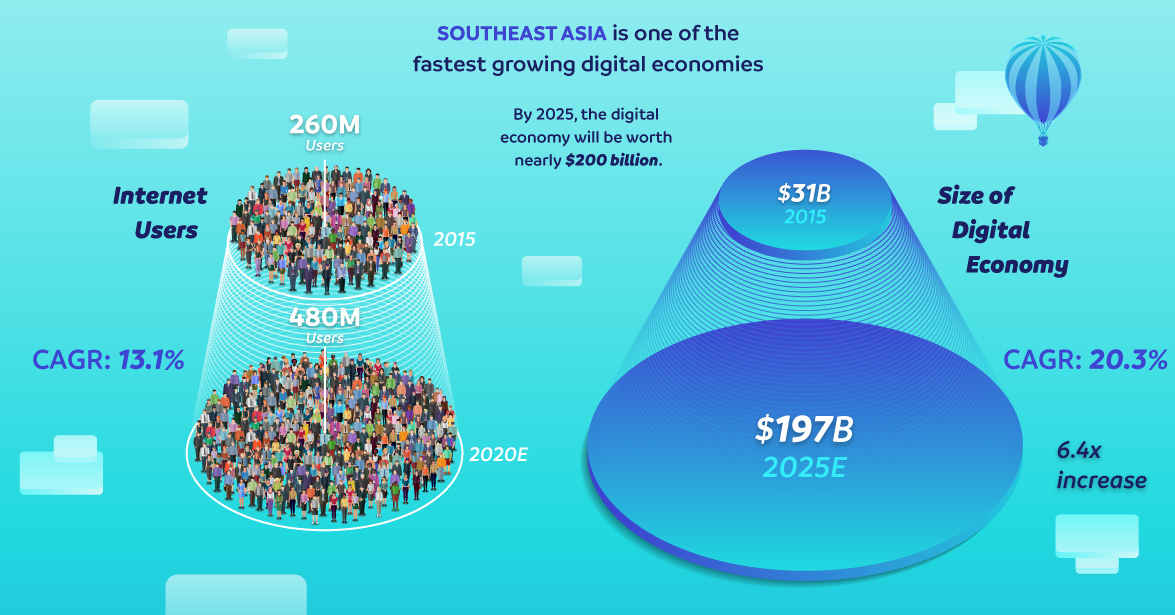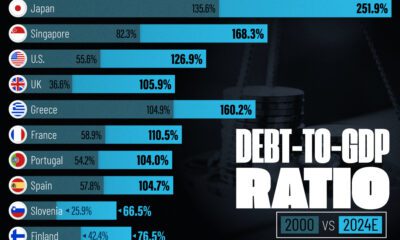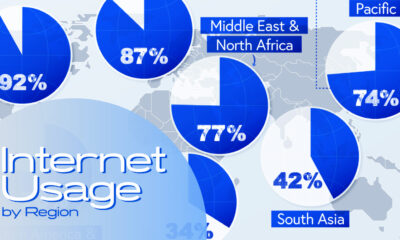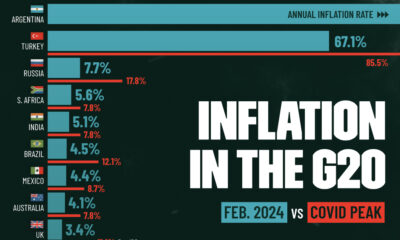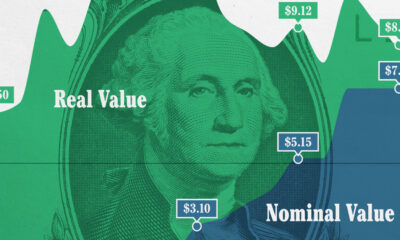Technology
Southeast Asia: An Emerging Market With Booming Digital Growth

Southeast Asia: An Emerging Market With Digital Growth Potential
When it comes to economic growth in Asia, the focus often falls on China.
However, while China’s story is continually staggering in its scale, the Chinese economic powerhouse is only a part of a much wider story in Asia.
Just like China, rapidly-growing countries like Vietnam, Indonesia, Cambodia, and The Philippines are also seeing their economies transform in meaningful ways – and Southeast Asia as a whole is becoming one of the most exciting regions for technological adoption, foreign investment, and digital innovation in the world.
Today’s infographic comes to us from Sea, and it helps shed some light on the digital wave that’s powering the growth across a geographically expansive and tremendously diverse region.
A Digitizing Economy
With a younger population, growing affluence, and people that are increasingly tech-savvy, the internet population in Southeast Asia is expected to swell from 260 million to 480 million between 2015 and 2020.
More and more business is being done online in the region – and as a result, it is estimated that by 2025, the digital economy in Southeast Asian countries will be worth a hefty $197 billion.
That’s an impressive 640% increase over the size just a decade prior.
Sectors to Watch
Which parts of the digital economy will see the most impact?
According to proprietary data from Google and investment company Temasek, the most interesting sectors to watch in the region should be in e-commerce, digital entertainment, online travel, and digital financial services.
| Est. growth in market size (%) between 2016-2021 | |||
|---|---|---|---|
| Greater Southeast Asia | U.S. | China | |
| E-commerce | 261% | 23% | 196% |
| Digital entertainment | 145% | n/a | 54% |
| Online travel | 90% | 15% | 172% |
E-commerce, which is expected to grow by 261% between 2016 and 2021, is one of the region’s most explosive sectors. With a lack of physical retail stores and limited choice of goods in Southeast Asia, rapidly-growing access to the internet provides a new means for people to shop.
Further, the travel and transportation market is also expected to boom with a 90% increase by 2021, and this will be driven by growing ridership in taxi-on-demand services. The area will also see its digital entertainment sector – defined as the combined mobile and PC gaming markets – grow at nearly triple the pace of China over the coming years (145% vs 54%).
Lastly, mobile payments is another sector to watch, as tech enables Southeast Asians to “leapfrog” traditional payment technologies like physical bank or credit cards. By 2021, mobile payments will have a 43% market share in the region.
Technology
Ranked: Semiconductor Companies by Industry Revenue Share
Nvidia is coming for Intel’s crown. Samsung is losing ground. AI is transforming the space. We break down revenue for semiconductor companies.
Semiconductor Companies by Industry Revenue Share
This was originally posted on our Voronoi app. Download the app for free on Apple or Android and discover incredible data-driven charts from a variety of trusted sources.
Did you know that some computer chips are now retailing for the price of a new BMW?
As computers invade nearly every sphere of life, so too have the chips that power them, raising the revenues of the businesses dedicated to designing them.
But how did various chipmakers measure against each other last year?
We rank the biggest semiconductor companies by their percentage share of the industry’s revenues in 2023, using data from Omdia research.
Which Chip Company Made the Most Money in 2023?
Market leader and industry-defining veteran Intel still holds the crown for the most revenue in the sector, crossing $50 billion in 2023, or 10% of the broader industry’s topline.
All is not well at Intel, however, with the company’s stock price down over 20% year-to-date after it revealed billion-dollar losses in its foundry business.
| Rank | Company | 2023 Revenue | % of Industry Revenue |
|---|---|---|---|
| 1 | Intel | $51B | 9.4% |
| 2 | NVIDIA | $49B | 9.0% |
| 3 | Samsung Electronics | $44B | 8.1% |
| 4 | Qualcomm | $31B | 5.7% |
| 5 | Broadcom | $28B | 5.2% |
| 6 | SK Hynix | $24B | 4.4% |
| 7 | AMD | $22B | 4.1% |
| 8 | Apple | $19B | 3.4% |
| 9 | Infineon Tech | $17B | 3.2% |
| 10 | STMicroelectronics | $17B | 3.2% |
| 11 | Texas Instruments | $17B | 3.1% |
| 12 | Micron Technology | $16B | 2.9% |
| 13 | MediaTek | $14B | 2.6% |
| 14 | NXP | $13B | 2.4% |
| 15 | Analog Devices | $12B | 2.2% |
| 16 | Renesas Electronics Corporation | $11B | 1.9% |
| 17 | Sony Semiconductor Solutions Corporation | $10B | 1.9% |
| 18 | Microchip Technology | $8B | 1.5% |
| 19 | Onsemi | $8B | 1.4% |
| 20 | KIOXIA Corporation | $7B | 1.3% |
| N/A | Others | $126B | 23.2% |
| N/A | Total | $545B | 100% |
Note: Figures are rounded. Totals and percentages may not sum to 100.
Meanwhile, Nvidia is very close to overtaking Intel, after declaring $49 billion of topline revenue for 2023. This is more than double its 2022 revenue ($21 billion), increasing its share of industry revenues to 9%.
Nvidia’s meteoric rise has gotten a huge thumbs-up from investors. It became a trillion dollar stock last year, and broke the single-day gain record for market capitalization this year.
Other chipmakers haven’t been as successful. Out of the top 20 semiconductor companies by revenue, 12 did not match their 2022 revenues, including big names like Intel, Samsung, and AMD.
The Many Different Types of Chipmakers
All of these companies may belong to the same industry, but they don’t focus on the same niche.
According to Investopedia, there are four major types of chips, depending on their functionality: microprocessors, memory chips, standard chips, and complex systems on a chip.
Nvidia’s core business was once GPUs for computers (graphics processing units), but in recent years this has drastically shifted towards microprocessors for analytics and AI.
These specialized chips seem to be where the majority of growth is occurring within the sector. For example, companies that are largely in the memory segment—Samsung, SK Hynix, and Micron Technology—saw peak revenues in the mid-2010s.
-
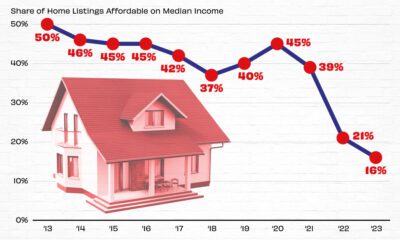
 Real Estate2 weeks ago
Real Estate2 weeks agoVisualizing America’s Shortage of Affordable Homes
-

 Technology1 week ago
Technology1 week agoRanked: Semiconductor Companies by Industry Revenue Share
-

 Money1 week ago
Money1 week agoWhich States Have the Highest Minimum Wage in America?
-

 Real Estate1 week ago
Real Estate1 week agoRanked: The Most Valuable Housing Markets in America
-

 Business1 week ago
Business1 week agoCharted: Big Four Market Share by S&P 500 Audits
-
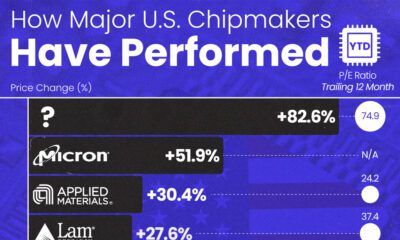
 AI2 weeks ago
AI2 weeks agoThe Stock Performance of U.S. Chipmakers So Far in 2024
-

 Misc2 weeks ago
Misc2 weeks agoAlmost Every EV Stock is Down After Q1 2024
-

 Money2 weeks ago
Money2 weeks agoWhere Does One U.S. Tax Dollar Go?

